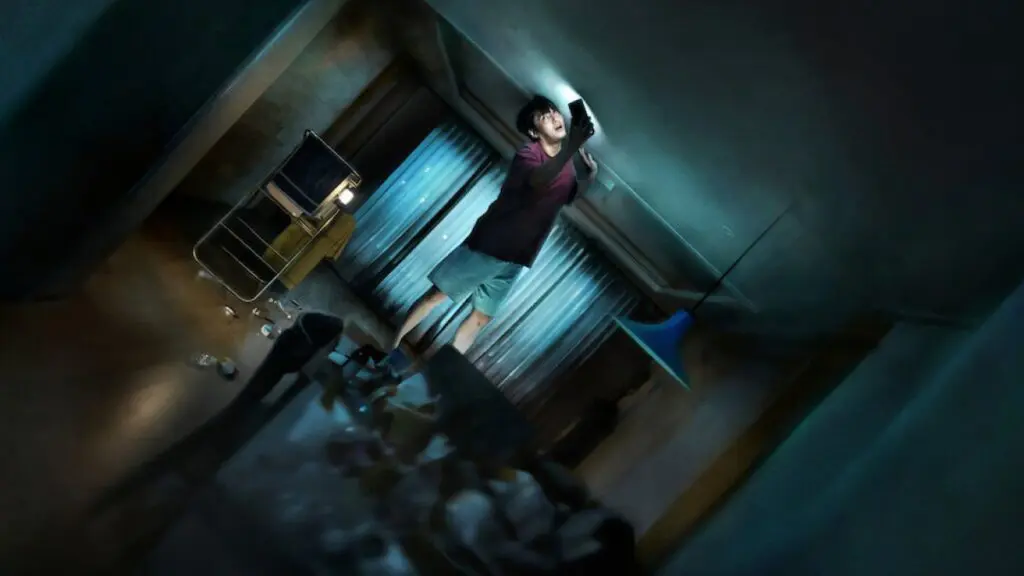
WARNING: THIS ARTICLE CONTAINS MAJOR SPOILERS
Years ago, when I lived alone, my neighbours were bonkers nocturnal drug addicts who never stopped banging on the walls for reasons I could never quite discern. Wall to Wall reminded me of this, which is perhaps why the first half of the Netflix movie is so anxiety-inducing. But the back half, leading all the way to the ending, is a mess, and the final takeaway, which is that no matter how hard you work and how much you suffer, your life is probably going to be rubbish anyway, leaves a lot to be desired.
The movie’s first half presents so many mysteries that the idea of unpacking them was tantalising. Now we’re here, though, I’m not sure there’s much point. The obvious themes of a predatory housing market, the misuse of technology, and the brittleness of dreams and ambitions are all bundled up in the messy climax, but the road to get there literally takes a hammer to the tense and enigmatic narrative foundations. We’ll break it down anyway, for posterity if nothing else, but this is the rare case of a movie sounding more interesting written down than it looks when it’s actually unfolding.

Knock Knock, Who’s There?
The central mystery of Wall to Wall is who – or indeed what – is causing the banging noises that poor Woo-seong hears constantly whenever he’s in the apartment of his dreams, which he essentially bankrupted himself in order to purchase. Sometimes it sounds like it’s coming from his upstairs neighbor, and sometimes from downstairs. The other residents all seem to think they’re coming from his apartment. Nobody is getting any sleep.
This compelling premise has a rather mundane explanation. Woo-seong’s upstairs neighbor, Jin-ho, is pumping the noises into various apartments using hacked intercoms. This is why they always sounded like they were coming from different places – they were. The access to and control of the various apartments give Jin-ho a kind of God-like power in the building, which he’s using for the nefarious purposes of creating the most dramatic story possible to report on in his role as an investigative journalist.
But there is a more specific objective to his meddling, tying in to the movie’s underlying themes. Jin-ho has previously made an effort to expose the kind of shady dealings that are invariably behind a bog-standard apartment building like this one, but was silenced by a prosecutor. That prosecutor turns out to be Eun-hwa, who is now the building’s resident representative, trying to turn a quick buck through dodgy arrangements and bribes.
Why Woo-seong?
It’s important to understand Woo-seong’s character arc to understand why he was such a prime target for Jin-ho’s manipulations. This is a guy who essentially bankrupted himself to procure the apartment of his dreams, only to discover that it was the apartment of his nightmares. He took out loans he couldn’t repay and lives in an environment of extremely cloying heat just to try and save money on air-conditioning. Even without the noises, he’d been miserable to the point of madness.
But the noises were explicitly designed to tip Woo-seong over the edge. It’s a fascinating, fitting story in Jin-ho’s eyes, the man who lost everything in the pursuit of his dream apartment, only to be driven to madness and despair. Jin-ho murders Woo-seong’s downstairs neighbour with the intention of framing Woo-seong for the crime.
To Jin-ho, Woo-seong is the perfect messenger for his point that the entire housing market is a rigged game and that young people are paying the price for it with their bank balances and their sanity. But Woo-seong has another idea.
Up In Smoke
Woo-seong convinces Jin-ho to frame Eun-hwa for the murder instead, which makes more sense since she’s the truly guilty party rather than an innocent bystander. The proof of Eun-hwa’s guilt is a ledger, which, thanks to the hacked intercoms, Jin-ho knows is in the apartment she shares with her husband. When he and Woo-seong break in and Jin-ho can’t find the ledger, it kickstarts a flurry of violence that leaves Eun-hwa and her husband dead and Woo-seong and Jin-ho both badly wounded.
Woo-seong sees an opportunity and burns the evidence that proves he signed his apartment over. He also refuses to help Jin-ho – understandably – and turns on the gas to ensure that anything else hidden in the apartment burns up in the ensuing blast. Eun-hwa’s dirty dealings can’t be proved, but neither can anything else, which, considering she got her just desserts anyway, seems fair enough.
An investigation takes place, but it goes nowhere, since the fire left nothing behind. Despite his ordeal, Wall to Wall provides the closest thing to a happy ending for Woo-seong, who gets his dream apartment once again without the threat of hostile neighbours and disturbing noises. Only when he steps inside the empty apartment, he laughs maniacally to himself as he once again hears banging coming from the apartments above and below.


